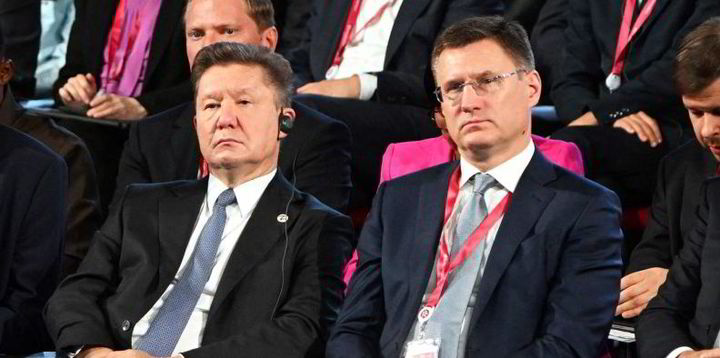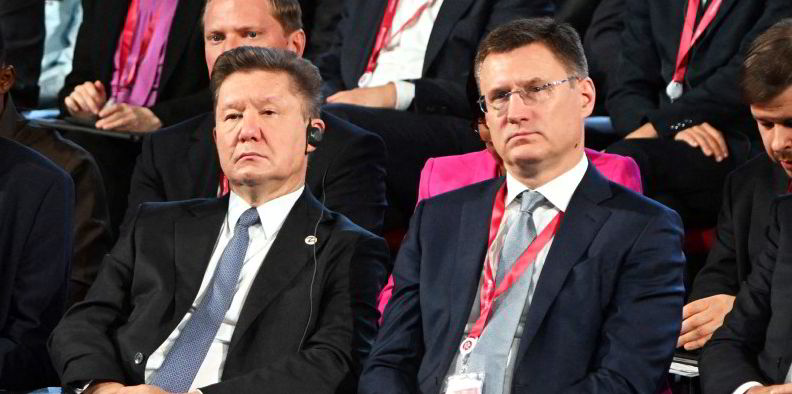Russia is counting on the ability of the nation’s state-controlled gas giant Gazprom and continued efforts by the government to foster gas purchase agreements in Central Asia to increase gas pipeline exports by almost 17 billion cubic metres in 2024 against last year, according to a top governmental official.
Gazprom sharply reduced Russian gas pipeline supplies to Europe in 2022 in retaliation for international sanctions against the country and its corporations, with deliveries failing to recover last year, thus depriving Gazprom and Russia’s coffers of billions of dollars of revenues.
According to deputy prime minister in charge of energy issues, Alexander Novak, the government anticipates Gazprom this year to ship 108 Bcm of pipeline gas compared to 91.4 Bcm in 2023.
In his article, reviewing the performance of country’s oil and gas industry and published in Moscow-based journal Energy Policy this week, Novak said the growth in gas exports would come mainly through the ramp-up of shipments to China via the Sila Sibiri 1 gas pipeline.
Although Gazprom only earlier this month said that Sila Sibiri 1 gas deliveries to China had reached “new daily records”, Russian gas supplies via this route to China were estimated at almost 23 Bcm in 2023 and are forecast to grow by 7 Bcm this year.
That leaves close to 10 Bcm of Russian gas that the Kremlin believes might reach customers in countries other than Russia through existing operational pipelines.
Article continues below the advert
Independent forecast
However, Russia’s leading oil and gas industry analyst, Mikhail Krutikhin, expressed strong doubt about Novak’s forecast.
In 2024, Krutikhin expects Gazprom to deliver 30 Bcm of gas to China via Sila Sibiri, 23 Bcm of gas to Europe and about or less than 20 Bcm to former Soviet countries in Central Asia — thus even lower than officially reported pipeline gas exports last year.
Speaking earlier in St. Petersburg, Uzbekistan Energy Minister Zhurabek Mirzamakhmudov was quoted by Russian state news agency Ria as saying that the country is readying a new gas supply agreement with Gazprom, with deliveries to begin closer to the start of the high-demand winter season.
Under an agreement signed last year, Gazprom committed to supply 2.8 Bcm of pipeline gas to Uzbekistan, however this contract will expire later in 2024.
Authorities in Kazakhstan also expect to finalise a gas supply agreement with Gazprom to start deliveries of Russian gas to the country’s north and northeast regions.
Meanwhile, Gazprom increased gas deliveries to Russia’s closest ally in Europe, Hungary, in January to 18 million cubic metres per day, or the annual equivalent of 6.5 Bcm, according to country’s Foreign Minister, Peter Szijjarto.
In 2023, Gazprom delivered 5.6 Bcm of gas to Hungary via the TurkStream subsea pipeline across the Black Sea to Turkey, and through onshore pipelines in southern Europe, Szijjarto wrote in a recent social media post, compared to supplies of 4.8 Bcm in 2022.
A partner in Moscow-based Kasatkin Consultancy, Dmitry Kasatkin, said that there is still some spare transportation capacity in TurkStream and another legacy subsea gas pipeline from Russia to Turkey, Blue Stream, that Gazprom could use to increase its export shipments.
Ukraine’s gas transit
Another Russia-leaning politician, Robert Fico — who was appointed Prime Minister of Slovakia last October — earlier this week hinted that the country plans to secure larger long-term access to Russian pipeline gas.
Following his visit to Ukraine this week, Fico said on social media that there is a possibility Ukraine might consider extending its gas transit supply agreement with Gazprom, due to expire at year-end, into 2025.
However, Kyiv has denied such intent.
“The position of the Ukrainian side is unambiguous: The transit contract expires at the end of the year,” Ukrainian Prime Minister Denys Shmyhal’s press office told Bloomberg.
“We are not going to talk to the Russians and extend the contract.”
Ukrainian gas industry analyst Sergiy Makogon said that the country’s “main goal is to limit Russian export income” at the time when proceeds from it are used by Moscow to finance its war in Ukraine.
Technically, Slovakia can book and pay for transportation capacities via Ukraine from January 2025 and buy Russia gas directly at the border of Russia and Ukraine.
“But this is not aligned with common position of the European Union to halt imports of Russian gas by 2027,” he said.
Makogon said that the issue is not about a new transit contract but more about whether to enable Russia to continue supplying gas to several loyal Eastern European countries, thus receiving annual revenues of about $6 billion and putting political pressure on those countries.

